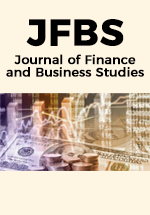
Journal of Finance and Business Studies (JFBS)
- Editor-in-Chief : Dr. Kadida Mashaushi (The Institute of Finance Management, Tanzania)
- Established : 2018
- ISSN : ISSN 3057-3076
- EISSN : eISSN 2591-6904
Description
Journal of Finance and Business Studies (JFBS) is an annual publication of the Institute of Finance Management (IFM). It publishes high quality articles of significant interest and relevance to researchers, academicians and practitioners operating in the areas of financial services, accounting, banking, insurance, commerce, economics, marketing, taxation and auditing.The JFBS engages in a double-anonymous peer review process, which strives to match the submitted manuscript with the expertise of a reviewer. Reviews are completed after providing constructive feedback to the author. This process ensures value addition to the submitted manuscript and improve the quality of the submitted manuscripts.
Table of Contents and List of Contributors
Vol 1 - 1 Issue
Vol 1 - Issue 1
-
Article 1
Paul R. KatoThis paper investigates the relationship between board structure and firm risk-taking in eight extractive firms listed in Nairobi Securities Exchange. The study uses five years of balanced panel data and fixed effects estimator design to examine the board structure and risk-taking (z-score). The results show board size is statistically significant and negatively associated with firm risk-taking, while gender diversity is statistically significant and positively associated with firm risk-taking. Additional evidence reveals the interaction between independent directors and gender diversi... -
Article 2
Ramadhani K. Mndeme, Bill KiwiaThis study examines the impact of interest and exchange rate volatility on private investment in Tanzania. The role of interest and exchange rates in the economy has been discussed. Interest and exchange rate volatility is known to have a significant effect on key economic variables; but whether it also affects private investment in Tanzania remains a puzzle. The study covers the period of 25 years from 1991 to 2015 and employed the Generalised Method of Moment (GMM) as a method of estimation. The results suggested that the interest rate has no effect on private investment compared t... -
Article 3
John K. NasaniaThis study investigates whether the export-led growth or growth-led export business strategy is suitable in the Tanzanian economy from 1970 to 2013. The research aims to check if the export-led growth (ELG) and growth-led export (GLE) doctrines are appropriate in the Tanzanian economy following the trade liberalisation in mid 1980s. Augmented Dicker Fuller test was employed to examine the unit root and the empirical results reveal that all variables are non- stationary at level and stationary at the first difference. Engle-Granger residuals and Johansen co integration test were utilised and... -
Article 4
Gregory D. LyimoThis study examines the ability of current cash flows and earnings to predict future cash flows in the Indian stock market. A total of 14,739 firm-year observations from non-financial firms listed on the Bombay Stock Exchange (BSE) from 2002 to 2014 were used. The regression models, as propounded by Dechow, Kothari and Watts (1998), were employed to assess the predictive ability of current cash flows and earnings to forecast future cash flows and their trends over time. The results reveal that both current cash flows and earnings are strong predictors of future cash flows. Additionally, the... -
Article 5
Gregory D. LyimoThis study examines the value relevance of Indian Generally Accepted Accounting Principles (GAAPs) after introducing profound financial reporting and firm governance reforms in India. Specifically, it scrutinises the association between share prices and both earnings and the book value of equity using 33,643 firm year observations. It employed robust regressions to estimate year- wise regression over the sample period that ranges from 2002 to 2015. The results reveal that accounting information proxied by earnings and book values of equity is value relevant over the sample period. The study... -
Article 6
Shufaa M. Al-beityThis paper aims to examine the determinants of auditor switching among the UK failing firms three years prior to failure. The determinants examined are auditor quality (competence) and independence (auditor size, opinion and fees), corporate governance (management change, gender diversity and board size), changing environment (change in the absolute size of the firm and growth of the firm) and financial condition (leverage, the variability of income and return on assets). The study uses a matched sample of 2912 UK failing and non-failing private firms and applies logistic regression analysi... -
Article 7
Zawadi Ally, Geoffrey MwambeEconomic Partnership Agreements (EPAs) are trade and development agreements between the European Union (EU) and African, Caribbean and Pacific (ACP) countries. The main objective of EPAs is to promote trade and sustainable development among the regions. This paper gives early ex-post empirical evidence analysis on the impact of provisionally applied EPAs on two- way trade flows between the East African Countries and the EU. The study examines the effect of the Framework Economic Partnership Agreement on East African Community trade with the EU for the period of twenty-eight (28) years from ... -
Article 8
Richard F. KiangiThe paper examines the interrelations between public expenditure and GDP using regression modelling, with data covering the period from 1966 to 2012. Augmented Dickey-Fuller and Phillips-Perron tests were conducted to determine if the time series of the variables were stationary. These models were further supplemented by the use of a Distributed Lag Model (DLM) to evaluate the degree and direction of interrelations between GDP and public expenditure. The findings provide empirical evidence supporting and validating the DLM, revealing that the growth of public expenditure is more influenced ...
Editorial Board
- Dr. Kadida Mashaushi - Institute of Finance Management , Tanzania
- Dr. Bernard Mnzava - Institute of Finance Management , Tanzania
- Dr. John KIngu - Institute of Finance Management , Tanzania
- Dr. Shufaa Albeity - Institute of Finance Management , Tanzania
- Dr. Elirehema Doriye - Institute of Finance Management , Tanzania
- Prof. Josephat Daniel Lotto - Institute of Finance Management , Tanzania
All inquiries related to this journal should be directed to editor-in-chief of this journal.